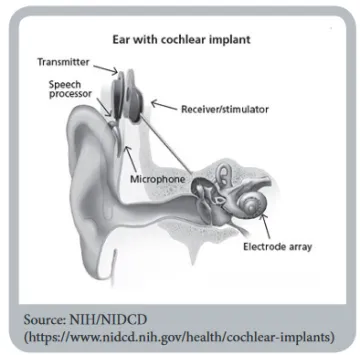
Cochlear Implants: Frequently Asked Questions
What is a cochlear implant?
A cochlear implant is a device that may restore some hearing for people with substantial hearing loss caused by problems in the inner ear. Research indicates that cochlear implantation gives patients with severe to profound hearing loss access to sounds and speech (Firszt, et al., 2004). Also, the method has been found to improve quality of life. (Hawthorne et al., 2004).
A cochlear implant is made up of internal and external parts. The receiver/stimulator is implanted in the temporal bone behind the ear, and the electrode array is placed in the cochlea of the inner ear. The device also includes the speech/sound processor, which is worn behind the ear. The sound processor converts speech and sounds into electrical energy. The implant directly stimulates the hearing nerve.
Am I a candidate for a cochlear implant(s)?
In general, cochlear implants may be suggested if your hearing aids no longer allow you to understand speech well. This is tested during a cochlear implant evaluation. There must be no medical or radiological contraindications. Other factors include motivation to participate fully in the (re)habilitation process, family support, and a clear understanding of the limitations of cochlear implants.
What can I expect with a cochlear implant?
Nearly all people who get cochlear implants can detect sound, including speech, at comfortable levels. Most people can pick out everyday sounds such as car horns, doorbells, and birds singing. The majority of people with implants develop the ability to recognize and understand speech in quiet environments without visual cues. Some can use the telephone, appreciate music, and converse successfully. The best results are seen in patients who have had some language skills or who receive a cochlear implant shortly after losing their hearing. Some listening environments, such as those involving background noise or those without visual cues, such as talking on the telephone, are particularly hard. Auditory therapy and cochlear implant reprogramming may improve performance. However, success in these challenging environments varies greatly among recipients.
What is the next step?
We encourage you to schedule an appointment for a cochlear implant consultation.
Firszt, J. B., Holden, L. K., Skinner, M. W., Tobey, E. A., Peterson, A., Gaggl, W., Wackym, P. A. (2004). Recognition of Speech Presented at Soft to Loud Levels by Adult Cochlear Implant Recipients of Three Cochlear Implant Systems. Ear and Hearing, 25(4), 375-387.
Hawthorne, G., Hogan, A., Giles, E., Stewart, M., Kethel, L., White, K., Taylor, A. (2004). Evaluating the health-related quality of life effects of cochlear implants: A prospective study of an adult cochlear implant program. International Journal of Audiology, 43(4), 183-192.

